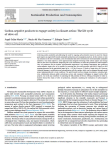Galán-Martín Á., Contreras M.d.M., Castro E. (2024). Carbon-negative products to engage society in climate action: the life cycle of olive oil. Sustainable Production and Consumption, 01/06/2024, vol. 47, p. 516-527.
https://doi.org/10.1016/j.spc.2024.04.025
https://doi.org/10.1016/j.spc.2024.04.025
| Titre : | Carbon-negative products to engage society in climate action: the life cycle of olive oil (2024) |
| Auteurs : | Á. Galán-Martín ; M.d.M. Contreras ; E. Castro |
| Type de document : | Article |
| Dans : | Sustainable Production and Consumption (vol. 47, June 2024) |
| Article en page(s) : | p. 516-527 |
| Langues : | Anglais |
| Langues du résumé : | Anglais |
| Catégories : |
Catégories principales 06 - AGRICULTURE. FORÊTS. PÊCHES ; 6.4 - Production Agricole. Système de ProductionThésaurus IAMM SYSTEME DE PRODUCTION ; HUILE D'OLIVE ; CYCLE DE VIE ; ANALYSE DU CYCLE DE VIE ; NEUTRALITE CARBONE ; PROTECTION DE L'ENVIRONNEMENT |
| Résumé : | Achieving carbon neutrality and addressing the need for ongoing carbon dioxide removal to meet the climate goal requires an urgent shift towards sustainable production and consumption practices. In this context, we turn our attention to the olive oil industry, a key food industry that strives towards more environmentally sustainable initiatives. Our study explores a novel approach that integrates bioenergy with carbon capture and storage (BECCS) into olive oil production. Employing Life Cycle Assessment, we assess the potential for carbon-negative olive oil production and its broader environmental implications. Our findings demonstrate that producing carbon-negative virgin olive oil is possible by powering the olive mill processes with BECCS based on olive prunings generated at the agricultural stage (up to ?0.32 kg CO2eq per 1-l bottle of virgin olive oil). However, collateral damages to acidification and eutrophication will also emerge, which can be mitigated through careful project planning tailored to local conditions. The path forward involves strategic investments, customized policies, collaboration between public and private sectors, and consumers' willingness to support carbon offset projects. Our work may contribute to unlocking the full potential of BECCS, offering a blueprint for other industries beyond the realm of olive oil production, ultimately catalyzing the realization of carbon-negative products. |
| Cote : | En ligne |
| URL / DOI : | https://doi.org/10.1016/j.spc.2024.04.025 |







